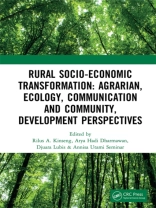Most of Indonesian population live in rural areas, and the majority of poor people also live in rural areas, namely 13.47% in rural and 7.26 in urban. In the past decades, rural communities as well as the ecology have changed fundamentally. Many factors contribute to this transformation: development programs from the government as well as from private and NGOs; the diffusion of information technology; the development of transportation facilities; the rise of education and health levels, interaction with ‘outsiders’, and so on.
A main driving factor for rural development has been agrarian liberalization. This can be seen in the development of transnational plantations, which trigger land grab and rise of land demand. Development trough liberalization also had a negative impact, since the development of modern and industrialized agriculture affected the environment, and the expansion of plantations caused changes in the agricultural systems of villages and the life orientation of local communities. Interventions in villages by private companies, intermediary institutions no doubt have brought a structural transformations in rural live: local institutions, livelihood systems, population structures, ecosystems, and relation to the land.
Unfortunately, the social, economic, cultural, and ecological transformation of the rural community not always produces improvement of quality of life for the rural community. At the same time, information and data related to rural transformations are scarcely available at research institutions, universities, NGOs, private enterprises.
Rural Socio-Economic Transformation: Agrarian, Ecology, Communication and Community, Development Perspectives discusses many aspects of the social, economic, cultural, and ecological transformation of rural life in Indonesia, and is of interest to academics and policy makers interested or involved in these areas.












